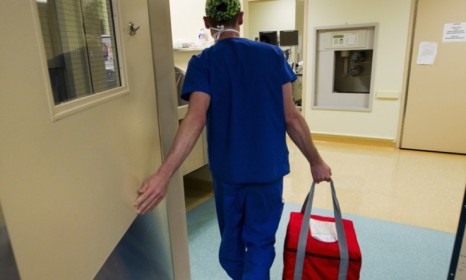New organ donor rules: 'Ghoulish' or smart?
Proposed changes in how and when organs can be taken from dead patients raise fears of vulture-like organ harvesters

A free daily email with the biggest news stories of the day – and the best features from TheWeek.com
You are now subscribed
Your newsletter sign-up was successful
The group that manages organ donations in the United States has proposed new rules, setting off a fiery debate among doctors and medical ethicists. The United Network for Organ Sharing (UNOS) — a nonprofit group that coordinates organ donations through a contract with the federal government — wants to let doctors immediately retrieve organs from a patient whose heart has stopped beating, rather than waiting a customary two minutes to see if it starts beating again. UNOS also wants to remove a ban on using organs from a patient until after doctors and family members have agreed to stop all life support. Here, a guide to this controversy:
What's the point of these new guidelines?
Roughly 6,000 Americans die each year waiting for donated organs. These proposed changes are meant to reduce the number of cases in which organ donation is compromised by delays. "The ultimate goal is to facilitate the dying wishes of patients who wish to be donors and save the lives of the 112,000-plus patients who are in need," Charles Alexander, past president of UNOS, tells The Washington Post.
The Week
Escape your echo chamber. Get the facts behind the news, plus analysis from multiple perspectives.

Sign up for The Week's Free Newsletters
From our morning news briefing to a weekly Good News Newsletter, get the best of The Week delivered directly to your inbox.
From our morning news briefing to a weekly Good News Newsletter, get the best of The Week delivered directly to your inbox.
What do critics say?
They worry that the new rules would promote a "ghoulish" culture of vulture-like doctors eager to harvest organs. "This is another step towards this idea of hovering, hovering, hovering to get more organs," said Michael A. Grodin, a professor of health law at Boston University.
Will these rule changes muscle families out of the decision-making process?
Not according to some observers. Some families "push extremely hard to have their loved one donate organs," Dr. Jeffrey Punch of the University of Michigan’s Department of Surgery tells ABC News. "They desperately want their loved one's last function on earth to be saving others' lives." But sometimes, delays in withdrawing life support make it impossible to harvest organs. "This is tragic for that family, as well as to the recipients that do not benefit." These changes merely seek to prevent such situations.
A free daily email with the biggest news stories of the day – and the best features from TheWeek.com
So why all the controversy?
The definition of "death," and who gets to determine when a patient is dead is at the center of it. If these rules take effect, "every hospital in America can now develop its own definition of 'dead,'" says bioethicist Gail Van Norman. "And that is profoundly disturbing." Others find such criticisms groundless. Punch, for instance, labels them "a hysterical and inappropriate reaction to a very minor change in some standards. There is zero threat to the public well-being."
Sources: ABC News, Newser, Washington Post
-
 Labor secretary’s husband barred amid assault probe
Labor secretary’s husband barred amid assault probeSpeed Read Shawn DeRemer, the husband of Labor Secretary Lori Chavez-DeRemer, has been accused of sexual assault
-
 Trump touts pledges at 1st Board of Peace meeting
Trump touts pledges at 1st Board of Peace meetingSpeed Read At the inaugural meeting, the president announced nine countries have agreed to pledge a combined $7 billion for a Gaza relief package
-
 Britain’s ex-Prince Andrew arrested over Epstein ties
Britain’s ex-Prince Andrew arrested over Epstein tiesSpeed Read The younger brother of King Charles III has not yet been charged